Darrin Bell Cartoons Make American White Again
Darrin Bell's 'Candorville' a Comics-Page Commentary on Trump Policies
Failed to relieve article
Please try again
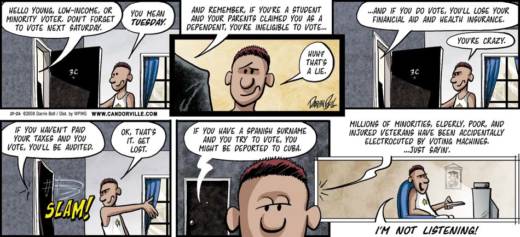
Darrin Bells Candorville tackled the issue of voter suppression in 2008. (Photo: Courtesy of Darrin Bell)
President Trump says he has a "running war with the media," and that might likewise include the funny pages. Comic strip artists have authored some of the sharpest political commentary directed against the President and his policies.
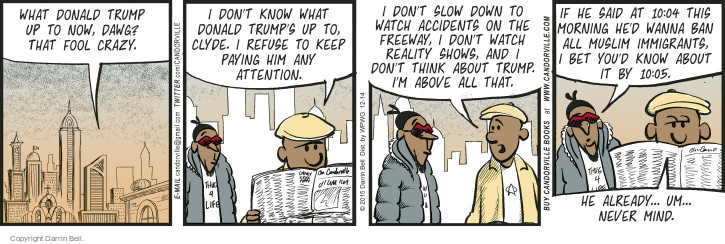
"Never normalize him," says cartoonist Darrin Bell, the creator of Candorville, a daily strip that has frequently mocked the President besides as his predecessors, and often explores race and gender issues. "I gave him the benefit of the doubtfulness, until he launched his campaign by calling Mexican illegal immigrants 'rapists' and 'murderers,' and it only got worse from there."
Bell launched Candorville in 2003, and it at present appears in more than than 100 newspapers effectually the state, including the San Francisco Relate and the San Jose Mercury News. The Los Angeles resident and University of California Berkeley grad recently won the 2016 Clifford K. and James T. Berryman Award for the editorial cartoons he also draws for the Washington Post.
Bell is both African American and Jewish, an identity that he says makes him one of the first people in the room to recognize Trump's bigotry. "Or perhaps it's more authentic to say I'grand the terminal ane in the room who has the luxury of ignoring it," Bell says. "And Donald Trump's actions have been screaming bigotry long before he insisted the offset black president produce non only his birth certificate, but his college transcripts and his college awarding. Trump'south deportment have been screaming bigotry ever since his company denied housing to minorities in the 1970s."
Multi-racial cast of characters
Candorville features a multi-racial cast, headed past Bell'south alter-ego, Lemont Brown, an African American single dad and deeply committed Trekkie and science nerd. Brown is also a freelance reporter, giving Bong the take chances to comment on Trump's contempt for journalists.
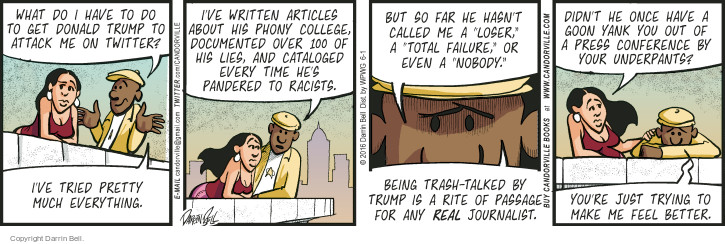
"Lemont felt that being insulted by Trump was a rite of passage," Bong says. "He wasn't actually a real journalist until he made information technology happen. But after he was forcibly ejected past his underwear from a press conference, Trump hasn't and so much as called him a 'loser' once."
Brownish spends a lot of time hanging out with his friends from childhood, Susan Garcia, an ad executive, and Clyde, a street hustler. In one of the about memorable strips, Clyde talks about getting back at a Trump supporter who calls him the "N" word.
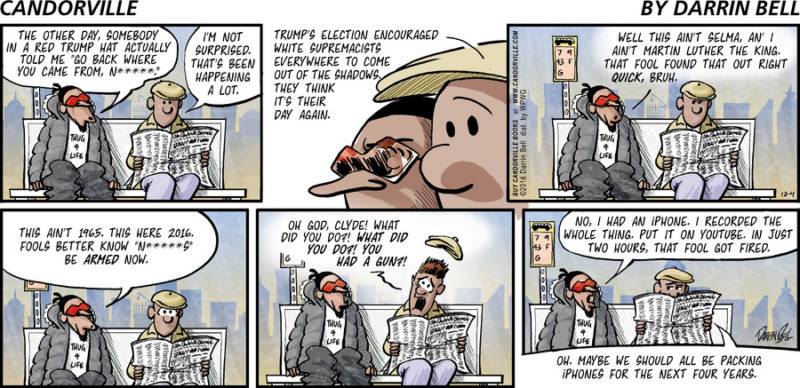
"I had my nearly contemptuous graphic symbol live out exactly how I thought I would deal with that kind of harassment if information technology were to happen to me," Bong says. "And as I ofttimes practise with Clyde, I used information technology as an opportunity to challenge readers' preconceptions about people who look like Clyde."
Comics not always a place for politics
The comics pages were once off-limits for political commentary. Just in the 1950s, Walt Kelly's Pogo took on red-baiting Senator Joseph McCarthy and so-Congressman Richard Nixon. (Kelly later caricatured Nixon, past then president, as a spider, spinning webs of cant, and Vice President Spiro Agnew as a hyena).
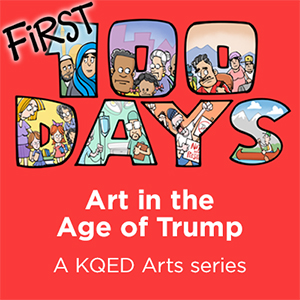
Charles Schulz'due south Peanuts tackled race in its characteristically gentle way; and Gary Trudeau has been lampooning political figures (starting with Nixon) in Doonesbury since it was first syndicated in 1970, often earning the strip banishment to the editorial pages. Bell'south contemporary Keith Knight, another African American cartoonist, also writes about politics in his daily strip The Knight Life.
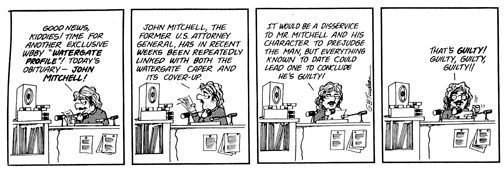
But Bell says he doesn't owe a debt to these pioneers simply. He cites as inspiration the neglected work of Jay Jackson, who created the strip Bungleton Green for the Chicago Defender,America's top black newspaper in the 1930s, every bit well as artists outside the earth of cartooning.
"I feel similar we all owe a debt to Honoré Daumier, to Mark Twain, to the courtroom jester, to Aristophanes," Bell says. "We actually all owe a debt to the very first hairy person who drew a funny flick on a cave wall well-nigh a mammoth-hunt gone wrong."
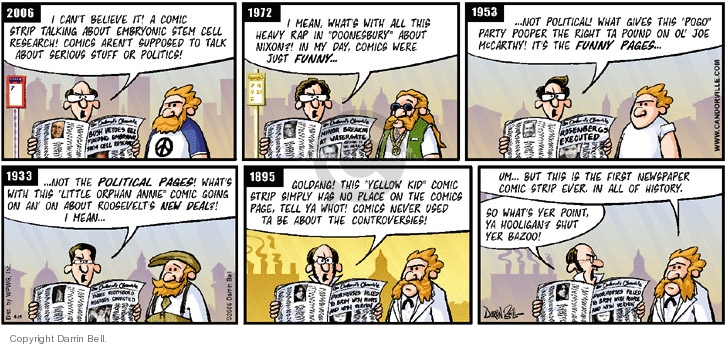
Also every bit seeing cartooning every bit one of the oldest art forms, he also considers it to have a long futurity. "32,000 years from now, long afterwards all of us are completely forgotten, political satire will withal be there," Bong says. "Because humanity will always, always produce smart-asses."
Care near what's happening in Bay Area arts? Stay informed with one email every other week—correct to your inbox.
Thanks for signing upward for the newsletter.

Source: https://www.kqed.org/arts/12731471/darrin-bells-candorville-a-funny-pages-feud-against-trump-policies
0 Response to "Darrin Bell Cartoons Make American White Again"
Post a Comment